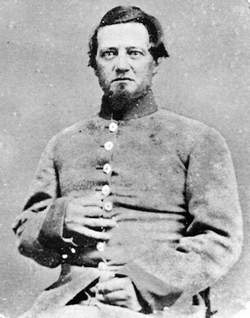http://www.ocala.com/article/20100516/COLUMNISTS/5161004/1278/news01?Title=Adam-thought-pineapple-would-do-well-
Adam thought pineapple would do well
By David Cook
Columnist
Published: Sunday, May 16, 2010 at 6:30 a.m.
Last Modified: Sunday, May 16, 2010 at 1:32 a.m.
When Adam Eichelberger died at the age of 81 in 1909, his obituary in the Ocala Star described him as "the father of the orange industry in Marion County."
 Adam Eichelberger enlisted as a private
Adam Eichelberger enlisted as a private
in the Marion Light Artillery in 1861. He
fought in numerous battles before returning
to Ocala to experiment in raising tropical
fruit crops.
William G. Hobday
He also was called "a conspicuous figure in Marion County history."
At the time, there were several other men who also might have qualified as being "the father" in the development of the citrus industry, but the record indicates that Eichelberger, in his own way, had as much right to the title as anyone.
He was a farmer, an experimental horticulturist and a tireless worker not only on his own farms, but in his participation in Ocala's civic affairs over nearly a half century. He was one of the earliest to recognize the possibilities of orange culture.
He developed several plantations during his lifetime, suffered many setbacks and endured great financial hardship during the years of Reconstruction following the Civil War. Yet, he persevered and regained much of his fortune before being struck down again by a series of freezes.
There was nobody who had a greater investment in orange trees in the mid-1890s when back-to-back freezes wiped out the citrus industry and helped plunge Marion County into a devastating economic depression. Somehow, the citrus industry made a comeback, and so did Adam Eichelberger, to a certain extent.
He maintained an extensive nursery at his Banana Hill Plantation, located in what is now south Ocala. His farm began at Southeast Eighth Street and extended south to about 17th Street, and was bounded on the east by Orange Avenue (now Southeast Third Avenue) and on the west by Orange Street (Southwest First Avenue).
His farm blocked most southbound streets and was one reason why Orange Avenue became the main south-bound street (later, the original U.S. 441) from Fort King Street south. Part of his farm became Hunter Park at the S Curve where baseball games were played in the early 1900s. Later, sports teams from Ocala High School (the building that is now Eighth Street Elementary) worked out and played there.
Eichelberger's old home, the last of several, was located south of Eighth Street, east of Osceola, until the 1950s. By then, of course, his fabulous nursery no longer existed.
Born in Newberry, South Carolina, Eichelberger is said to have developed a scientific inclination early. At age 20, he went west to find his fortune and was one of the fortunate "gold-rushers" who found gold.
In 1850, he visited Mexico, Panama and Cuba, and became interested in the cultivation of oranges and other tropical fruits. He developed a vision of his future life, and thought Florida offered what he wanted. He settled in Ocala to set out his first orange grove.
He eventually would have more than 800 acres of orange trees in cultivation and because he also was having some success in growing banana plants, he called his farm Banana Hill Plantation.
When war came in 1861, he left it all behind and enlisted in a new company, the Marion Light Artillery, as a private He took part in a number of campaigns, but also contributed his considerable wealth to the Confederate cause.
Hundreds of bales of cotton from his other farms, and possibly that of his brother Wade near Belleview, were confiscated during the war. Through the years, he sought compensation for his cotton but never got it.
After the war, Adam returned to Ocala to try to regain his fortune. It was a difficult time for everyone, but he found a solution in what he now called his Banana Hill Nursery. He would sell trees and plants to others, and also would sell planted orange groves.
He also took a gamble in growing pineapple plants and was wildly successful until the first time the winter temperature fell below freezing. At one time in the 1870s, the Banner said he had shipped more than 500 barrels of pineapples north aboard the Ocklawaha River steamboats. Expectations were high - but soon dashed.
In 1874, he placed a list of trees and vines available from his nursery. It included 10,000 banana plants delivered to the boat dock at Silver Springs at $15 per hundred; 10,000 two-and-a-half year old orange seedlings from $25 to $40 per hundred; 5,000 two-year-old orange seedlings bundled with limes, lemons, citrus and orange at $25 per hundred; and 5,000 flowers and scupernong grape vines at $15 per hundred.
He advertised two of his bearing orange groves in the Star shortly before his death on a trip to Atlanta. One was Idlewild Grove consisting of 228 acres near Lake Panasoffkee for $20,000 - or $10,000 for a half interest.
The other was Shell Mound Grove containing 180 acres near the Withlacoochee River. He was willing to part with it for $11,000 cash.
He claimed both groves were desirable from the standpoint of healthfulness, with a great abundance of game and fish nearby. He also claimed the groves were protected from freezes by their nearness to water.
Whether the properties were sold was not reported. He denied that orange culture was "an experiment of questionable result." He predicted success to the buyer because of the special adaptation of soil and location, "guided by practical knowledge."
The trouble was - few had his practical knowledge.
An avid Marion County historian, David Cook is a retired editor of the Star-Banner. He may be contacted at 237-2535. 



